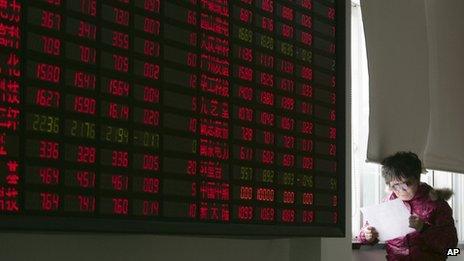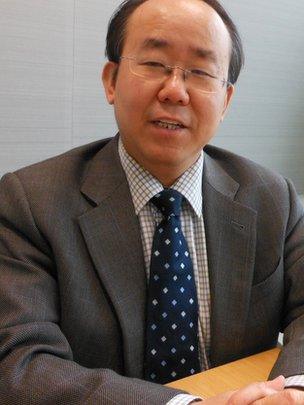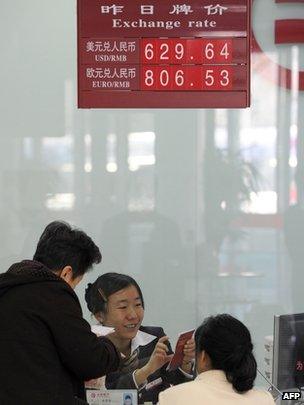China loosens grip on yuan investment in Hong Kong
- Published

Foreign investors are keen to invest directly in shares in Chinese firms
Financiers outside mainland China have so far had few options about how to invest the tightly controlled Chinese currency.
But as Beijing promotes the yuan, also known as the renminbi (RMB), as a truly international currency, it is starting to loosen its iron-clad grip.
On Tuesday, E Fund Management, one of China's largest asset managers, will for the first time offer its customers in Hong Kong the option of investing yuan directly in stocks and bonds on the mainland.
"This is a pilot programme," Charles Wang, chief executive of the Hong Kong arm of E Fund, tells BBC News in his office high above Victoria Harbour in the former British colony.
"It's kind of experimental."
Capital flows
E Fund is one of 21 Chinese fund managers and brokerages allowed by Beijing regulators to take part in the so-called Renminbi Qualified Foreign Institutional Investors (RQFII) programme.
Mr Wang believes that if the scheme is successful, it could contribute to making the yuan fully convertible for both trade and investment in as little as five years.
"China's financial markets are still very isolated from the international financial markets," says Mr Wang.
"But this will change. Eventually, capital flows will go both ways, like a reservoir."
Baby steps

Mr Want says the changes will make the yuan more attractive to investors
The entire programme, approved by regulators as recently as in December, has an investment quota of just 20bn yuan ($3.2bn; £2bn).
There is also a 20% limit on how much can be invested in shares in Chinese companies. The remaining 80% must be invested in government and corporate bonds.
The scheme was designed by Beijing officials to be conservative, Mr Wang explains.
"'Don't go crazy' was the message," he says. "They want to make sure it's a success, that people don't lose money."
Fund managers will lobby for the scheme to be enlarged, with the view to have such quotas scrapped in future, Mr Wang predicts
Attractive currency
Before the scheme was introduced, investors outside the mainland could either keep their yuan in the bank, or purchase yuan-denominated bonds in Hong Kong.
Both options meant holding their yuan outside the mainland.
Now, for the first time, yuan held outside China can be channelled back to the mainland through capital investments.
This makes the currency more attractive to investors.
"People hold the US dollar because they want to invest in the US stock market," Mr Wang explains.
"Nobody wants to keep money under the mattress."
Higher returns

The yuan is tightly controlled and seriously undervalued, investors say
After Chinese companies were allowed to settle imports and exports with yuan in 2009, yuan deposits in Hong Kong banks surged tenfold to 630bn yuan, according to DBS.
Most of that money has been kept in the banks.
Investors accept interest rates of less than 1% because they hope to profit from the yuan's appreciation against the US dollar.
By contrast, investments in yuan-denominated bonds in Hong Kong, also known as dim sum bonds, yield around 4.5%, according to Nathan Chow, an economist at DBS Bank.
He says investors stand to make slightly more money with the Renminbi Qualified Foreign Institutional Investors programme.
But, like Mr Wang, he believes the greater significance of the scheme is that it allows Chinese currency to find a way back to China.
"Renminbi flowing out of the mainland is growing very quickly, but you can't let it grow in just one way," Mr Chow says.
Economists say the uneventful repatriation of the yuan is an important prerequisite for China to achieve before removing capital controls.
Too little?
A number of the 21 Chinese financial firms approved by Beijing have started selling their services to investors.
Mr Chow believes it is much too soon to say whether the scheme will be successful, but adds investor demand, especially from funds, has been strong.
E Fund, which bills itself as China's second-largest asset manager, is accepting subscriptions from individual investors with bank accounts in Hong Kong, and institutional investors from around the world.
Michael Pettis, a professor at Peking University, believes the Renminbi Qualified Foreign Institutional Investors scheme is a small step in the right direction.
"Anything that results in further opening of the market is positive," he says.
"But the key steps are liberalising interest rates and reforms of domestic banking system. I don't see much movement on that."
Mr Pettis believes it is much too risky for Beijing to remove capital controls if the banking system is an organ of the government, rather than a commercially driven entity free of interference.
His views are echoed by many in Hong Kong's financial circles.
For his part, Mr Wang of E Fund believes the scheme is an opportunity for his company to make a name outside China, and beyond Hong Kong.
"Hong Kong is the first step," he says.
"If you want to make the renminbi an international currency, you cannot make it available only in Hong Hong. Eventually, you have to make it available in all other financial centres and major trading centres."